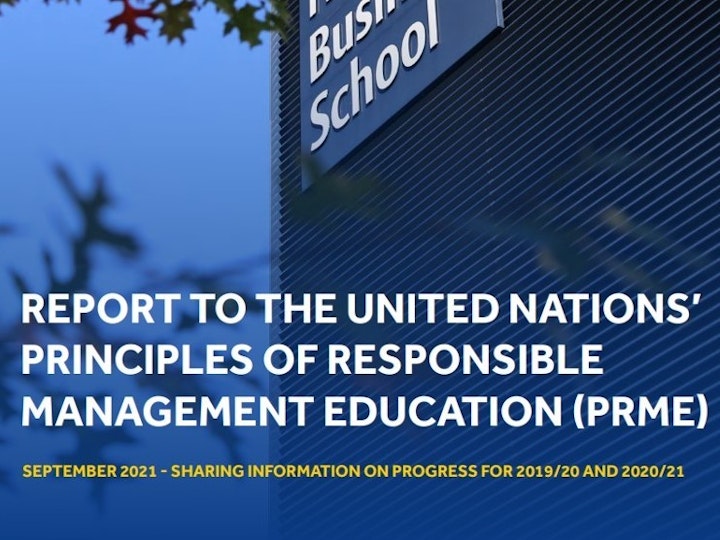UN PRME report shares Henley’s progress towards sustainable development goals
Henley's Report to the United Nations' Principles of Responsible Management Education (PRME) shares the steps we have taken towards the UN's sustainable development goals.

Our biennial Report to the United Nations’ Principles of Responsible Management Education (PRME) shares the progress Henley Business School has made towards the UN’s sustainable development goals (SDGs), including the launch of a new research centre.
The report shares the steps we have taken towards the goals we set in our last report in 2019, and outlines new aims for the Business School for the next two years, showing our continued commitment to championing the principles of responsible management education.
Henley is a signatory of the PRME for about a decade, however as an institution we have a long history of balancing economically, socially and environmentally responsible management and our values and mission for business professional higher education is congruent.
Progress made
Four goals were set in the previous PRME report, which were: improving inclusion; developing sustainable learning in our undergraduate Business and Management course; improving our campuses to become a ‘green’ institution; and developing Henley’s international partnerships.
Examples of the clear progress we have made towards these include the creation of our Equity, Diversity and Inclusion Committee, our Bronze Athena SWAN gender charter mark, and introducing engagement with sustainability and ethics themes earlier in the BA Business and Management programme.
The report includes details of the work by both the Business School and the wider University of Reading towards making our campuses “greener”, such as increasing the amount of renewable energy we generate through solar panels on our buildings.
It also features examples of the increased live synergistic action and communication between Henley and our international partners, including our South Africa campus, such as virtual roundtable events and live dialogues across staff and partners held earlier this year. This enables them to share the leading roles they have been playing in increasing social impact in their local contexts, and developing local partnerships for SDGs, which are important for positive social change
We are pleased to share details in the report of a new Centre for Business Ethics and Sustainability at Henley, which brings together a wide group of academics across different disciplines and subjects working to advance knowledge in ethics and sustainability.
Also reflected upon in the report is the Business School’s responsible response to the COVID-19 pandemic, and the ways in which Henley maintained an emphasis on Quality Education (SDG4) despite the disruptions and challenges to students’ and staff’s lives.
Looking ahead
The report sets three new goals that the Business School is committed to meeting in the next two years, which are:
- Engaging our World of Work (WoW) forum - part of an ongoing inter-institutional dialogue between our academics, employers and wider industry and alumni – with the UN SDGs
- Further integrating dialogue around the SDGs into teaching and learning, including the introduction of new modules to encourage students to learn more about sustainability and the SDG values
- Bringing experience, developments, and successes from Henley South Africa into our educational partnerships in China.
Professor Kleio Akrivou, Director of the Centre for Business Ethics and Sustainability, said:
“Management education has been threatened in various ways recently as the global pandemic has greatly affected how we connect, learn and teach in communities of practice, and in how we flourish and grow through education. Henley and its communities wish to be part of a fairer and responsible world: we therefore chose to view this as an opportunity rather than a threat. I am proud of our work in launching the new research centre and am pleased to share our 2021 Henley SIP Report which highlights all of the activities we have carried out as an organisation, towards our sustainable development goals”.
A short summary of the report can be found here, and the full report can be found here.



